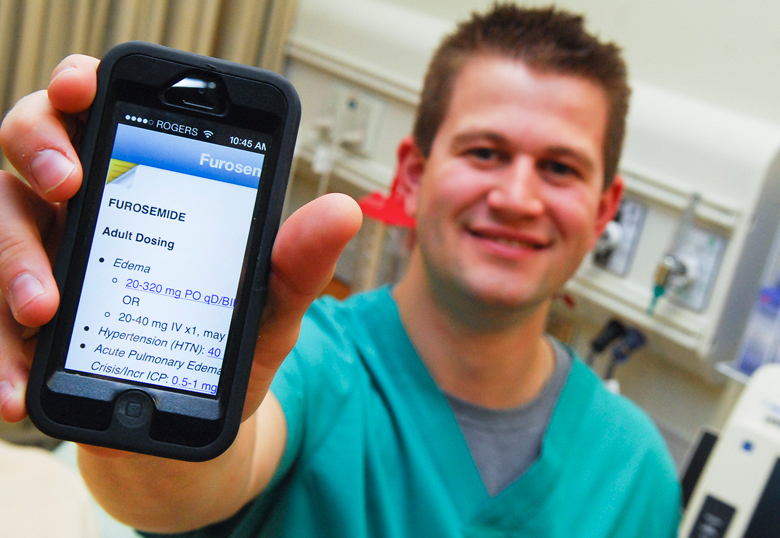A research project underway at Chinook Regional Hospital aims to determine if having medical information at the fingertips of student nurses improves their clinical decision-making at patient bedside.
During the 15-month study, which started last May, about 30 fourth-year nursing students from the University of Lethbridge will have an application installed on their mobile phones that contains a wealth of medical and nursing information.

Researchers are comparing the clinical decision-making of these student nurses with other student nurses who do not have the app. Students without the app would typically leave the bedside and locate information in a medical textbook or, in the case of a medication issue, consult with the hospital pharmacist. All student nurses are under the supervision of registered nurses at the Alberta Health Services (AHS) hospital.
“The ability to make sound clinical decisions is vital to ensure patients receive safe, high-quality health care,” says study lead Dr. Monique Sedgwick, assistant professor in the Faculty of Health Sciences at the University of Lethbridge.
“Health care is an information intensive environment. With this study, we’re trying to determine if clinical decision-making improves with immediate access to current, evidence-based information about patient diagnosis, treatment and nursing care.”
Dr. Sedgwick says nurses make clinical decisions every day that affect patient care. Common decisions include whether to change a bedridden patient’s position to prevent bedsores, whether to alert a physician if a patient’s condition is deteriorating, whether to change a patient’s medication, or determining what supports patients will need after leaving the hospital.
A patient who complains about pain post-surgery requires a nurse to make several clinical decisions at bedside, she adds.
“Nurses must assess the kind of pain the patient is experiencing,” says Dr. Sedgwick. “The nurse must take into consideration when the patient last had medications for the pain, whether the medication worked, whether there were side effects and whether the type of pain is typical following that particular type of surgery.
“Using information gathered from textbooks or the mobile app, nurses decide if the medication will be given, if another type of medication is more appropriate, how the medication will be given, how much medication will be given, or if medication is the most effective way to relieve the pain.”
The application used in this study was developed by the U.S.-based medical software firm Pepid, and contains as much information as would be found in multiple textbooks.
Nursing student Tony Slezina says the application has been a huge help during his work placement in the intensive care unit, allowing him to answer questions for patients and their families right at bedside.
“We can look things up on the app and say, ‘OK, yeah, we’re on the right course here,’ ” he says.
Adds Dr. Sedgwick: “Preliminary findings suggest the app helps students in their reasoning and clinical decision-making. That said, no conclusions can be drawn until the study concludes in July 2014.”
Chinook Regional Hospital is a teaching hospital where, each year, more than 600 nurses are trained along with numerous sub-specialties, internships and other clinical placements.
Site manager Ryan Thomson says he’s pleased the facility is contributing to this study.
“I can’t say enough about the partnership we have with the University of Lethbridge and the unique opportunity to move research projects like this forward here in our own backyard,” says Thomson. “I am passionate about applied research that helps us grow and learn.”
The $10,000 study is funded by the Western North Western Canadian Association of Schools of Nursing and the University of Lethbridge Teaching Fund.
Alberta Health Services is the provincial health authority responsible for planning and delivering health supports and services for more than 3.9 million adults and children living in Alberta. Its mission is to provide a patient-focused, quality health system that is accessible and sustainable for all Albertans.
